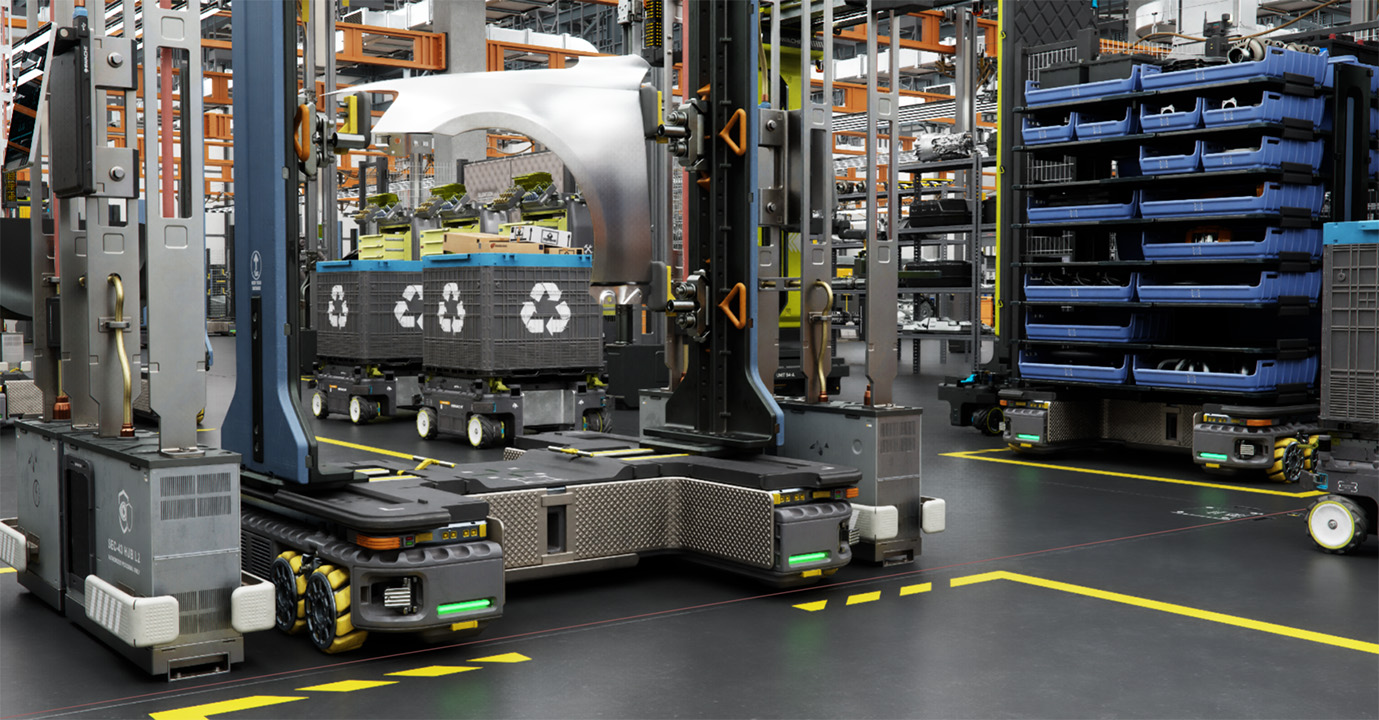108.0 Release Highlights#
RTX - Real-Time 2.0 is Now the Default Render Mode#

A factory scene captured at 120fps at 2560x1440 in RTX Real-Time 2.0#
Real-Time 2.0 matches or exceeds the performance of the old Real-Time (Legacy) mode, while providing visual fidelity that approaches that of the reference Interactive mode. As a full path-tracing solution, Real-Time 2.0 removes a number of limitations with the old Real-Time (Legacy) mode, particularly around transmissive materials like glass, and is simple to use, requiring no configuration of settings for the vast majority of applications.
Which render mode is enabled at startup can be modified.
In the application’s Preferences UI’s under Edit -> Preferences -> Rendering -> RTX Renderers. By default none are specified, which results in the RTX Renderer determining its own default modes to enable. If any are enabled through this UI, upon restarting the application, only those will now be enabled.
With commands at startup:
--/persistent/rtx/modes/rt2/enabled=truefor the RTX - Real-Time 2.0 mode,--/persistent/rtx/modes/pt/enabled=truefor the RTX – Interactive (Path Tracing) mode, and--/persistent/rtx/modes/rt/enabled=truefor the RTX Real-Time (Legacy) mode.
Added#
Improved detection of diffuse and specular albedo changes by the denoiser so that dynamic texture updates are less blurry. [
OMPE-48592]Added a warning to the log on startup if measured PCIe bandwidth is very low (less than 30% of expected bandwidth), thus indicating an issue with the system that will negatively impact performance. [
OMPE-38001]Improved performance for meshes with time-sampled primvars. [
OMPE-17036]Added support for per-instance primvars such as
doNoCastShadows. [OMPE-42925]
Fixed#
Fixed an issue where incorrect bounds computation would fill the logs with repeated warnings. [
OMPE-56685]Fixed an issue causing visible lights to not be pickable. [
OMPE-56367]The beams mode for the lidar model would sometimes return an incorrect hit distance. This has been fixed. [
OMPE-54520]Fixed an occasional deadlock when using OnChange event notifications from RTX settings. [
OMPE-53960]Fixed excessive DLSS ghosting when moving prims. [
OMPE-53847]Fixed application crashes when processing LiDAR point cloud data. [
OMPE-52673]Fixed a crash during mesh build. [
OMPE-52317]Fixed an issue where changing
omni:rtx:skipinteractively had no effect. [OMPE-51251]Fixed an issue where Kit would fail to start in Vulkan mode on devices with integrated graphics [
OMPE-50709]Changing a multimatte ID on an object or material would not update the rendered AOV until the stage was recomposed. This is now fixed. [
OMPE-49815]Fixed an issue where reducing the render resolution would cause the render to become corrupted. [
OMPE-49802]Fixed an issue where orthographic view in Real-Time mode sometimes produced artifacts such as black spots or color striping. [
OMPE-49571]Fixed continuous error output from scenes containing invalid shader prims when Fabric Scene Delegate was enabled. [
OMPE-48847]Fixed a rare crash related to texture streaming. [
OMPE-41761]Fixed a descriptor pool initialization error reported in Isaac Sim and Isaac Lab. [
OMPE-40889]
Known Issues#
Real-Time 2.0: Materials with subsurface scattering (SSS) can sometimes display bright spots with the default samples value of 32. This can be fixed by setting Subsurface Scattering > Max Samples Per Frame to 1 in the Real-Time 2.0 settings.